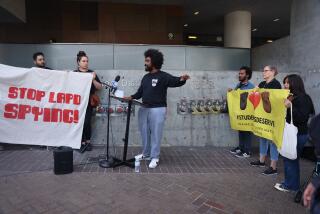LAPD ends another data-driven crime program touted to target violent offenders

The Los Angeles Police Department has scrapped a second data policing program it once hailed as a way to target violent offenders in neighborhood hot spots, following concerns that the programs unfairly target black and Latino communities.
Chief Michel Moore and other department leaders decided Wednesday to end Operation LASER, a program begun in 2011 to pinpoint locations connected to gun and gang violence.
The move came after a meeting Tuesday at which members of the department’s civilian oversight panel questioned the effectiveness of data-driven strategies that rely on algorithms and other computer technology to identify violent offenders and map out areas most prone to criminal activity.
“We discontinued LASER because we want to reassess the data,” Josh Rubenstein, the LAPD’s chief spokesman, said Friday. “It was inconsistent. We’re pulling back.”
The action was another acknowledgment that the once highly touted predictive policing programs that were adopted early on by the LAPD and other agencies across the nation have proved thornier to implement. Privacy and civil rights groups have long asserted that the programs, which use data gathered by officers, are intrusive and racially biased.
At Tuesday’s Police Commission meeting, Moore argued that the programs have led to the lowest crime rates in years. The algorithms, he stressed, do not use race or gender as identifiers.
However, police leaders recognized the concerns raised by commissioners and the public, Rubenstein said. The department still plans to use data tools to fight crime and “are evaluating options” on how to move forward, he said.
LASER, or “Los Angeles’ Strategic Extraction and Restoration,” zones, used data mapping to increase police presence in hot spots and identify specific “anchor points” such as liquor stores, parking lots and residences connected to certain crimes in an area. Analysts, not computers, identified where many crimes occurred and where to send more officers.
An inspector general audit released last month described LASER like this:
“The basic premise is to target with laser-like precision the violent repeat offenders and gang members who commit crimes in the specific target area. The program is analogous to laser surgery, where a trained medical doctor uses modern technology to remove tumors or improve eyesight.”
But the audit found that the data programs lacked oversight and that officers used inconsistent criteria to label people who were likely to commit violent crimes. It also said the department lacked insufficient data to measure the programs’ success.
Commissioner Shane Murphy Goldsmith applauded the LAPD for ending LASER, saying it was a “recognition that the programs have eroded public trust.”
“The department absolutely made the right decision,” she said. “I absolutely appreciate the members of the community who have raised concerns for a long time.”
The Stop LAPD Spying Coalition hailed the decision Friday. The group sued the city to get more records on the how the zones affected residents and homeowners. A trial is scheduled for August.
“It’s a great thing that LASER zones have ended,” said Jamie Garcia. “It was a complete failure to not investigate this program. The fight is not over.”
Proponents contend that much of the violent crime occurs in poor communities of color.
Hamid Khan, another coalition coordinator, said, though, that the program led to excessive policing and increased surveillance in poor neighborhoods, adding, “we need to know the impact.”
The department also recently spiked a more controversial segment of LASER that identified and monitored so-called chronic offenders who were most likely to commit violent crimes. Once identified, they were included on lists of the worst offenders in a given area.
Amid outcry, the department in August stopped issuing the lists and using an offender database. The public did not learn about the decision until last month.
The department defended the data tools last summer, and Moore supported auditing them for possible problems.
Last week, the chief told commissioners that the department will not use programs that fail to produce results and will strive to “identify new or emerging ideas that hold promise.”
“Crime reduction strategies are never static,” Moore wrote in a memo to the Police Commission. “We will continue to learn and evolve in our work.”
More to Read
Sign up for Essential California
The most important California stories and recommendations in your inbox every morning.
You may occasionally receive promotional content from the Los Angeles Times.











